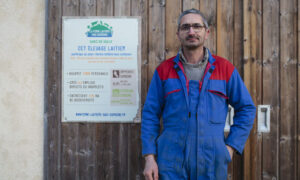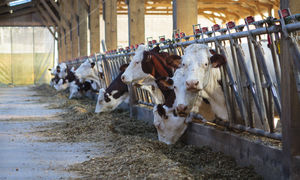Low-carbon dairy farm: reducing the climate impact of milk production in the mountains
« Ferme laitière bas carbone », literally Low Carbon Dairy Farm aims to promote agricultural practices and actions to reduce by 20% the carbon footprint of milk production by 2025. This French approach is led by the CNIEL (National Interprofessional Centre for the Dairy Economy), in partnership with the Livestock Institute, France Conseil Élevage and the Chambers of Agriculture.
Climate change mitigation in the dairy sector
Climate diagnosis and action plan
The Low Carbon Dairy Farm consists of conducting an environmental and technico-economic diagnosis on each farm and identifying potential actions to improve its carbon footprint. The objective is to build a progression strategy in collaboration with the farmer, so that the action plan fits the realities of the farm and its economic and social context.
The first step proposed in this approach consists in raising awareness and understanding of the environmental impact of a dairy farm, thanks to a self-assessment tool enabling each farmer to estimate his carbon footprint by himself.
An individual visit to the farmer by a qualified advisor will then provide a more precise assessment of this footprint and identify possible actions. The CAP’2ER® tool (initially developed by the Livestock Institute as part of the Life Carbon Dairy project) measures the impact of livestock farming on the climate: the greenhouse gas emissions of livestock farming, the energy consumption, but also its positive contribution to biodiversity, its feeding capacity (number of people fed by livestock farming) and its carbon storage. There are two levels for this CAP’2ER® tool: level 1 collects 27 data to assess a production facility (milk or meat) in order to raise awareness and monitor it. Level 2 includes and collects 150 data with results for the whole farm, enabling the implementation of a real action plan to reduce emissions. (See the list of organisations able to carry out a CAP’2ER® diagnosis).
Sustainable benefits of the actions carried out on the farms
Following the diagnosis, actions are envisaged according to the reality and constraints of each farm. These actions, designed together with the farmer, may for example consist of revising the effluent management, reducing chemical inputs or improving the farm’s energy consumption.
In Auvergne-Rhône-Alpes, the farm Croix Pomiers that groups 85 Montbéliardes cows, carries out actions to increase the food autonomy of livestock farming through by implementing rotational grazing, increasing the share of legumes, with certain impacts for the reduction of chemical inputs. Still in this region, the farm of Sully has managed to reduce fertiliser inputs by 33% and to increase its food autonomy by cultivating alfalfa and chicory. See testimonials.
The primary objective of the Low Carbon Dairy Farm approach is to support livestock farmers in reducing their impact on the climate. However, environmental benefits are not the only ones to arise from these actions: the valorisation of pasture or the reduction of inputs also have economic repercussions for the farm. According to the data collected as part of the approach, the 10% of farms with the lowest greenhouse gas emissions have on average a gross margin of €10 more per 1,000L of milk produced. The socio-economic and environmental sustainability of the approach thus constitutes a real “win-win” solution for the farmer and the climate.
Today, more than 11,000 breeders are involved in this approach and 1,000 advisors are trained and qualified to implement the approach.
Resources
The initiative is based on the Life Carbon Dairy project (2013-2018) launched by the Livestock Institute in partnership with the CNIEL, France Conseil Elevage and the Chambers of Agriculture. This pilot project aimed at reducing greenhouse gas emissions by 20% in 3,900 dairy farms in six regions, raising awareness among farmers and training more than 100 advisors and breeders on greenhouse gas emissions and identifying practices implemented by “low carbon” farms.
The pilot project proved to be a success and was extended to the whole country: in 2015, the Low Carbon Dairy Farm approach was launched – awarded the same year by the Nicolas Hulot Foundation’s “My Positive Impact” competition.
Today, within the framework of the Low Carbon Dairy Farm, the CNIEL and the CRIELs finance diagnostics with Regional Councils (Centre Val de Loire, Pays de la Loire, Auvergne-Rhône Alpes, Nouvelle Aquitaine). In addition, some of the dairy factories involved in the approach support the farmers they collect.


Adaptation to climate change in dairy production
Agricultural production and climate change are intrinsically connected and are both influenced by each other. In mountain areas, the effects of climate change on milk production have been studied by the CNIEL in the CLIMALAIT programme (2015-2019).
With the support of various partners such as the Livestock Institute, INRAe, the Chambers of Agriculture, Météo France, Arvalis and BTPL, the CLIMALAIT programme aimed to study the future evolution of the climate over the century and its impact on dairy farms. The programme helped to collectively identify tools for adapting to climate change in some twenty milk-producing areas throughout France.
Among the studies carried out, the one conducted in the Jura Plateaux demonstrated the clear impact of climate change on milk production. In this mid-mountain region, dairy farming is the main agricultural activity, with in particular a high production of Protected Designation of Origin products. While these mid-mountain plateaux are usually characterised by cold temperatures and abundant precipitations, the study carried out already noted the increase precipitations, the study carried out already noted the increase in temperatures in the region, especially in summer. Coupled with a relative decrease in rainfall, these climatic phenomena contribute to the appearance of more frequent summer droughts and a reduction in summer grass production.
Based on this observation, the group of livestock farmers involved in the Jura study identified several ways of adapting to the effects of climate change: increasing hay stocks for drier years, growing cereals to make the farm more self-sufficient, growing alfalfa, which has proven to be a fodder resource better adapted to the changing climate, or raising more cows that are less productive and thus reducing inputs.
Some solutions promoted in the framework of CLIMALAIT as tools for adapting to climate change are also used in the framework of the ‘Low Carbon Dairy Farm’ approach as actions to reduce the climate impact of dairy production. Food autonomy and reduction of chemical inputs, among others, can therefore be levers for both adaptation and mitigation of climate change in mountain areas.